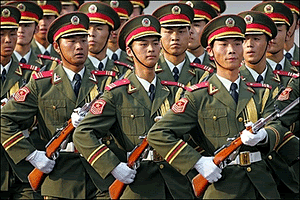China's economy grew at an extraordinary rate of 11.9% in the second quarter, the fastest clip in more than 12 years and a pace that puts the nation on track to overtake Germany this year as the world's third-largest economy.Chinese productive dynamism is causing concern among trading partners (China's unfair trade practices are at issue), and the overheating of Chinese economy could result in contractionary policies destablizing to the Chinese state.
For the last 35 years, the United States, Japan and Germany have ranked 1-2-3 in gross domestic product, but as growth in those mature economies has slowed, China's has accelerated, powered by foreign investments and trade amid a global shift in production activity to the Far East.
Just 12 years ago, China's economy ranked No. 8, behind Brazil's, and was less than one-third the size of Germany's.
What's interesting about China's rise, though, is how the strong economic numbers outstrip indicators of social indicators of prosperity and sustainability:
While China's economic transformation has lifted millions out of poverty, its 1.3 billion people have a long way to go before their standard of living catches up with those of the other top economies.These quality of life issues -- foundations of a nation's economic and productive dynamism and competitive longevity -- are important factors in evaluating the significance of China's rise for international politics.
The government's intense focus on economic growth has led to environmental degradation and violent clashes as farmland is appropriated for development.
Shoddy manufacturing and tainted food products from China have recently damaged its reputation worldwide.
Ordinary Chinese were incredulous at the notion that China's economy, by any measure, could surpass Germany's....
Despite China's overall size and growing clout in the global economy, Chinese officials and scholars say the country is still developing and grappling with critical issues of lifting millions out of poverty and reducing the widening income gap between the city and countryside, where most Chinese live.
As noted in yesterday's post, the international system is returning to more traditional patterns of global balance-of-power competition. Russia and China (especially) will be key rivals to U.S. unipolarity, and their strategic intentions will be at odds with the post-Cold War settlement of unrivaled American leadership in the dominant organizations and regimes of global life.
Both states will use their wealth and regional influence to block the power of the U.S. and its allies in their backyards. For China, though, reaching the ranks of the top three is a particularly important step in establishing significant countervailing pressure.
The rise of the Chinese state will continue to raise questions of the appropriate American response. Should we contain or engage the rising dragon? As China has key interests in closer cooperation with the West -- and in maintaining access to Western markets -- a worst-case overreaction by the U.S. would be a mistake. China is decades away from deploying a world-class blue water navy, and its strategic nuclear capabilities are still dwarfed by the techological superiority of the U.S.
Nevertheless, recent Chinese anti-satellite missile tests, and the nation's long-range goals of reaching parity, demonstrate the tenacity of Chinese balancing tendencies. So, while engagement of the rising dragon is in America's interests, it's always prudent to hedge one's bets concerning China's aspirations to genuine great power status.


No comments:
Post a Comment